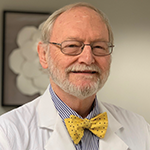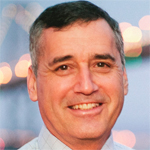‘Rheumatologists may not make the most money, but they make the most smiles.’ —Dr. Gourley
On the last day of the rotation, Dr. Gourley brought me to his office. He asked how the clerkship went and where I was going from there. And then he gave some sage advice about career development. I wondered if he had picked up on my desire to make the most out of my struggles from medical school. Maybe he sensed my enthusiasm about being in a rheumatology clinic.
“You have a lot of time to think,” Dr. Gourley said. “Consider our field. Rheumatologists may not make the most money, but they make the most smiles.”
Throughout the rest of medical school and the beginning of residency, I routinely communicated with Dr. Gourley and let him know about my adventures. He always replied with enthusiastic support. In fact, he wrote a letter of recommendation on my behalf for residency. Slowly, over time, we lost contact. I thought he had gotten busy. Certainly residency had made me busy, and he was orders of magnitude more occupied. I was shocked when I returned for an interview at the NIH in September 2013, and I didn’t see him. He had since retired and was focusing on his health. He passed away in 2016.
It hurt that I could not announce to him that I would become a rheumatologist. He passed away only a few months before my graduation. I had an email ready to send to him, thanking him for all the encouragement and support he offered when I felt at my most vulnerable. The draft still lies, unsent, in my mailbox. I would love to say that sense of regret goes away over time, but it doesn’t. Maybe that’s why Dr. Brasington’s words about not letting mentors get away stuck in my mind.
Although I never got to say goodbye to Dr. Gourley, I continually feel his presence in my day-to-day work. Dr. Gourley’s research in various autoimmune conditions means I think about his contributions a lot in clinic. As an educator, I have sought to incorporate many of his behaviors and attitudes. His keen recognition of the need to create a sense of belonging among learners of all levels has informed how I engage medical students, residents, fellows and others in the clinic and conferences. Further, his statement about smiles remains as relevant as ever. Rheumatologists should be known as members of “the happiest specialty,” and we should wholeheartedly strive to ensure we have enough support so we can spread those smiles.


